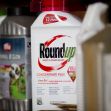The herbicide/weed killer Roundup, which contains the active ingredient glyphosate, has been banned in several countries because the International Agency for Research on Cancer (IARV) found glyphosate to be “probably carcinogenic to humans.” Concurrently, under California’s Proposition 65, also known as the Safe Drinking Water and Toxic Enforcement Act, Roundup and other glyphosate-containing products were compelled to carry “clear and reasonable” warning labels that say the chemical is “known to the state to cause cancer” or “words to that effect.”
When the IARV, a French agency, used the word “probably” however, the safety of glyphosate became legally debatable. A coalition of over a dozen crop growers, farmers, agribusiness corporations, and trade associations, known by the acronym “NAWG,” which stands for lead plaintiff the National Association of Wheat Growers, sued the California Attorney General, requesting an injunction to stop the warning labels. Plaintiffs claim that by requiring them to state that glyphosate was a “known” carcinogen, the Attorney General violated their First Amendment rights to be free from compelled speech and improperly subjected them to Prop 65’s fines of $2500 per day for each violation.
Prop 65, which was enacted to “enable Californians to make informed decisions about their exposure” to harmful chemicals, also allows private enforcement mechanisms and has led to thousands of lawsuits, including a $10 billion class action suit settlement paid by Bayer, which purchased Roundup from Monsanto, in 2018.
Plaintiffs claim that Prop 65 is unconstitutional since warning labels require them “to convey a controversial, fiercely contested message that they fundamentally disagree with.” They argued that California has “less burdensome ways to convey its message than to compel plaintiffs to convey it for them.” To support their claims of controversy, they argue that federal regulators, including the Environmental Protection Agency. as well as California and several international regulators, “have all concluded that glyphosate does not pose a carcinogenic hazard” or risk to humans.
The Ninth Circuit agreed with the plaintiffs on November 7. In a 2-1 decision authored by Circuit Judge Consuelo M. Callahan, with a concurrence by Patrick J. Bumatay and a dissent by Mary M. Schroeder, the court explained that its decision follows settled commercial speech case law. Commercial speech promotes some types of commerce, and the U.S. Supreme Court has ruled that since it is less protected than other types of speech under the First Amendment, it is subject to “intermediate scrutiny” that is less rigorous than the First Amendment’s “strict scrutiny” test used for political speech or other highly protected forms free expression, but more rigorous than the “rational basis” test used for laws that don’t implicate First Amendment concerns.
Callahan wrote that as a result of intermediate scrutiny, precedent holds “the government may only compel commercial speech” if it can demonstrate that the “compelled commercial speech is purely factual and uncontroversial.” Because of the conflicts in opinions from members of the scientific community, the words “known to cause cancer,” are misleading, “not purely factual” and “controversial.”
The Ninth Circuit opinion provided a historical overview of glyphosate, which was introduced in 1974 and is now “the world’s most commonly used herbicide…approved for use in more than 160 countries.” Because of its popularity, it has been the subject of many scientific studies. The opinion traced the history of the lawsuit that was first filed in the Eastern District of California in 2017, where William B. Shubb, Presiding District Judge of the Eastern District of California, granted plaintiffs a partial injunction.
In 2018, California Attorney General Rob Bonta moved to amend the preliminary injunction and proposed three possible labels with new language that eliminate the words “known to cause cancer” and replace them with others. The district court denied Bonta’s motion for reconsideration because it “was still deficient (and) it improperly conveys the message that there is equal weight of authority for and against the proposition that glyphosate causes cancer, or that there is more evidence that it does.”
Both parties filed motions for summary judgment in 2019. The district court used the intermediate scrutiny test for commercial speech and found “that although California had a substantial interest in informing consumers of cancer risks, the misleading nature of the warning about glyphosate’s carcinogenicity did not directly advance that interest.” Bonta appealed again. The Ninth Circuit opinion clarified the single issue before it: “What level of scrutiny applies to the Prop 65 glyphosate warning?”
To answer, they first reviewed the U.S. Supreme Court’s decision in Zauderer v Office of Disciplinary Counsel of Supreme Court of Ohio. This case allows states to require advertisers to disclose certain information that will not violate their First Amendment rights. It allows commercial speech as long as the information it discloses is “purely factual and uncontroversial.” It concluded that Roundup’s information was not only not purely factual, but was “false and misleading” and “controversial.” All three of Bonta’s attempts at alternative language were rejected, as was a new version proposed by the California Office of Environmental Health Hazard Assessment. The opinion said, the “overall message that glyphosate is unsafe… is, at best, disputed.”
The Ninth Circuit thus affirmed the ruling of the Eastern District of California saying, “The State and the Attorney General undoubtedly have good and legitimate interests and strong policy arguments in support of seeking to proactively warn California citizens about a chemical that they deem to be carcinogenic.” Callahan acknowledged that “there can be inherent risks associated with a “wait-and-see” approach when it comes to forms of evolving science. But the fact that science is evolving is all the more reason to provide robust First Amendment protections.” She also said California can advance its views in other ways that do not require plaintiff’s labels to be used as a “billboard.” Prop 65 warnings are, in this instance, unconstitutional.
Drugwatch reports that as of October 2023, there were 4,237 open Roundup cases. Bayer offered $10.9 billion to settle “roughly 100,000 cases, but a judge did not allow the settlement. Despite the Ninth Circuit's recent ruling, the legal battles will go on, and those who do not want to be exposed to glyphosate will not be able to depend on Roundup labels for clear and reasonable warnings. For now, they will get no warnings at all.






